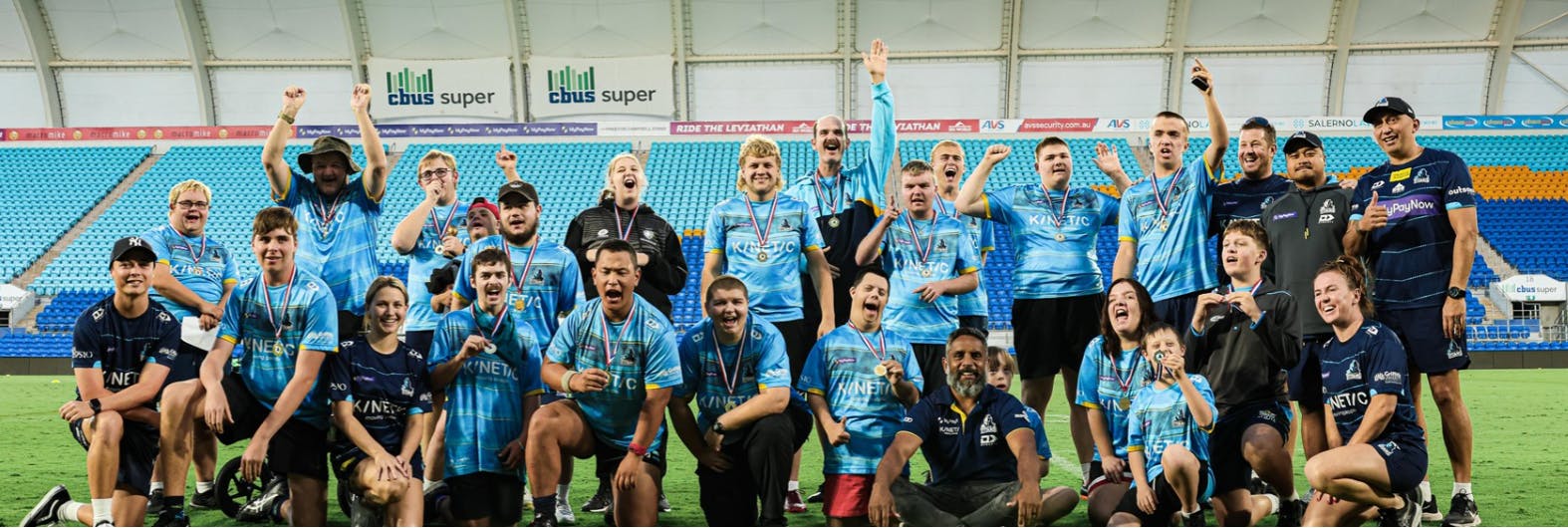Harnessing Technology and Research to Advance Accessibility in Sport
At Griffith University, our research is driven by a vision of creating inclusive futures where participation, equity, and accessibility are not optional, but fundamental. My collaboration with the Gold Coast Titans on the Leagueability program exemplifies this vision. By integrating sport, technology, and evidence-based education, this initiative has pioneered new pathways for people with disabilities to access the physical, social, and developmental benefits of community sport.
ActiveKIT: A Catalyst for Innovation
This transformative project was made possible through funding from the Queensland Government’s ActiveKIT (Knowledge Innovation Technology) program. ActiveKIT’s mission is to support innovative solutions that increase physical activity and health outcomes through the use of knowledge, technology, and partnerships. The Leagueability initiative was awarded funding under Round 2, enabling us to extend its reach beyond face-to-face delivery and into a sustainable, scalable digital format.
With ActiveKIT support, we have been able to translate the Titans’ successful Leagueability program into an innovative online learning platform that empowers community coaches, volunteers, and clubs to establish inclusive rugby league opportunities. By combining government funding, professional sport expertise, and academic research, this project has set a new benchmark for inclusive practice in Australia.
Shaping the Partnership: My Role
A critical element of the project’s success has been the unique collaboration between Griffith University, the Gold Coast Titans, and Playbk Sports. My role has been pivotal in bringing Playbk Sports, a leader in sport-tech educational design, into the partnership. Recognising the need for high-quality digital learning experiences, I facilitated this collaboration to ensure the program could be delivered effectively, engagingly, and accessibly across Queensland and, in time, nationally.
Through my networks and expertise in sport management and educational technologies, I positioned Griffith as the research partner that could evaluate impact, while also enabling Playbk Sports to contribute their technical and pedagogical expertise. This tripartite model, professional sport, technology partner, and research institution, represents an innovative ecosystem for driving social change through sport.
To support the efficacy of the online content, I led a research project ‘fostering a culture of accessibility and education’ (Titans CEO Steve Mitchell, NRL, 2024a).
Leagueability and Pathway to Play
The Leagueability program itself provides people with disabilities the opportunity to participate in rugby league, promoting not only physical activity but also social inclusion and confidence building. To date, it has made a tangible difference in communities across southeast Queensland.
The launch of Pathway to Play, a world-first eLearning course hosted on the Titans Teach Learning Management System, represents the next stage in this evolution. Co-designed with Playbk Sports, the course equips coaches and volunteers with the skills, knowledge, and confidence to run inclusive programs in their local clubs. By covering inclusive coaching strategies, governance, and safeguarding principles, Pathway to Play provides a structured, accessible blueprint for community clubs to replicate.
Leveraging technology was a critical catalyst for change, contributing significantly to the expansion and long-term sustainability of the LeagueAbility program (NRL, 2024a). The program achieved a 530% growth in players since 2018, with participation expanding from 12 players to 76 by 2024 (Personal Communications Report: Titans, 2024).
Notably, the course also integrates the lived experiences and expertise of disability advocates, medical professionals, and former elite athletes, ensuring that inclusivity is approached holistically. Delivered fully online, it breaks down geographic and logistical barriers, allowing volunteers in remote and regional communities to access training at their own pace.
Griffith University’s Research Contribution
At Griffith, I lead the research agenda underpinning this project. Our evaluation examines participant engagement, educational outcomes, and the broader social impact of the program. This evidence base ensures that the online training is not only innovative but effective in empowering communities to implement sustainable, inclusive sport practices.
By embedding systematic research into the program, Griffith plays a central role in shaping inclusive sport policy and practice. Our findings will inform future initiatives, guide government and industry investment, and provide a replicable model for other sports seeking to embed equity and accessibility at their core.
Creating Inclusive Futures
What makes this initiative particularly aligned with Inclusive Futures is its integration of technology, community, and research to achieve social change. It demonstrates that inclusive futures are built when institutions like Griffith leverage their research expertise to create practical solutions in partnership with industry and government.
The success of the Leagueability and Pathway to Play projects shows that with the right collaborations, barriers to participation in sport can be dismantled. Thousands of Australians with disabilities now have greater opportunities to play, connect, and thrive through rugby league. Just as importantly, coaches and volunteers, who are the backbone of community sport, are better equipped to ensure that inclusion is not an afterthought but a foundation.
Looking Ahead
As the project continues, our research will generate insights into the long-term sustainability of inclusive digital education in sport. These findings will shape future iterations of the program and provide an evidence base for scaling inclusive models nationally and internationally.
Through ActiveKIT funding, industry partnerships, and Griffith’s research leadership, this project stands as a model of how we can harness technology to advance equity. My role in shaping the collaboration, securing the right partners, and leading the research agenda has ensured that inclusivity is embedded at every stage of the initiative.
Conclusion
The Leagueability initiative and Pathway to Play course are more than sport programs; they are vehicles for equity, accessibility, and community transformation. For Griffith Inclusive Futures, they represent the kind of research-led impact that demonstrates our commitment to shaping a society where every individual, regardless of ability, has the opportunity to participate, belong, and thrive.


